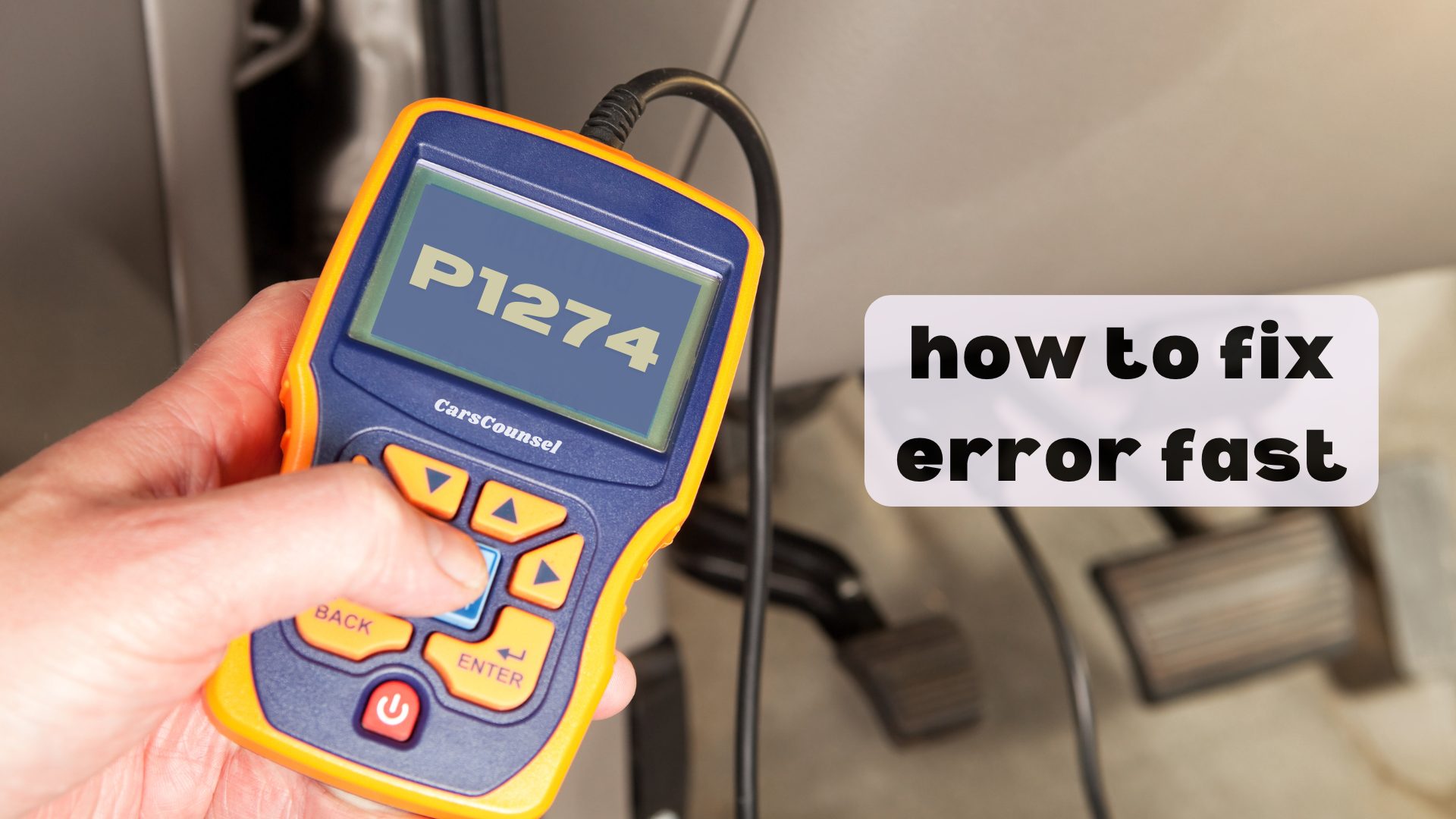Did you know that nearly 20% of vehicles on the road today have a faulty oxygen sensor, which can lead to issues like the P1274 code? You’re not alone if you’ve recently encountered this problem, where your Air Fuel Ratio Sensor 1 on Bank 1 has malfunctioned, causing a rich shift.
This can lead to decreased fuel efficiency, rough idling, and even engine misfires. But what exactly is causing this issue, and how can you fix it? The answers might surprise you, and understanding the root cause of the problem is vital to getting your vehicle running smoothly again.

Quick Navigation
Key Takeaways
- The P1274 code indicates an issue with Air Fuel Ratio Sensor 1 on Bank 1, affecting the engine’s air-fuel mixture and fuel efficiency.
- Faulty Air Fuel Ratio Sensor 1, vacuum leaks, dirty fuel injectors, and fuel pressure regulator issues can cause the P1274 code.
- Symptoms of a rich shift include decreased fuel efficiency, rough idling, engine misfires, and a strong fuel odor from the exhaust.
- To diagnose the P1274 code, use a scan tool to retrieve the code, interpret its meaning, and monitor live data to observe the sensor’s operation.
- Repairing the Air Fuel Sensor involves inspecting, cleaning, and replacing it if necessary, and ensuring proper calibration after replacement.
Code P1274 Description
When your vehicle’s onboard diagnostics (OBD) system triggers the P1274 code, it indicates a specific issue with the Air Fuel Ratio Sensor 1 on Bank 1 in your engine.
This error code monitors a rich shift in the air-fuel mixture delivered to the engine. The Air Fuel Ratio Sensor 1 measures the amount of oxygen in the exhaust gases and provides feedback to the engine control module, helping adjust the air-fuel mixture for ideal combustion and fuel efficiency.
The sensor’s functionality is vital in maintaining the perfect air-fuel ratio, which directly impacts fuel efficiency. Any malfunction in the sensor can lead to decreased fuel efficiency, among other issues.
It’s essential to address the P1274 code promptly to avoid further complications.
Common Causes of Failure
Since the P1274 code is triggered, it’s essential to identify the root cause of the issue.
You’ll need to pinpoint the problem to fix it efficiently.
Some common causes of failure include:
- Faulty Air Fuel Ratio Sensor 1, which may require sensor calibration
- Vacuum leaks in the intake system, leading to an inaccurate air-fuel mixture reading
- Dirty or clogged fuel injectors, restricting proper fuel delivery
- Issues with the fuel pressure regulator, affecting the air-fuel mixture
- Faulty oxygen sensor, providing incorrect data to the engine control module
Symptoms of a Rich Shift
Frequently, a rich shift in the air-fuel mixture triggers a set of symptoms that can be quite noticeable.
You may experience decreased fuel efficiency, which can be a significant concern for you as a driver. Your engine’s performance may also be affected, leading to rough idling or stalling.
Additionally, you might notice engine misfires, which can cause your vehicle to jerk or stumble. The Check Engine Light will likely illuminate on your dashboard, indicating that there’s an issue that needs attention.
Moreover, you may detect a strong fuel odor coming from the exhaust, which can be a sign of a rich shift in the air-fuel mixture. In addition, the rich mixture may cause oxygen sensor readings to fluctuate, leading to further problems down the road.
Diagnosing the P1274 Code
One crucial step in fixing the P1274 code is to diagnose the issue accurately.
You’ll need to use a scan tool to retrieve the code and interpret its meaning. This will give you a clear understanding of what’s causing the problem.
- Connect a scan tool to your vehicle’s OBD-II port to retrieve the P1274 code
- Interpret the code to determine the specific issue with the Air Fuel Ratio Sensor 1
- Use the scan tool to monitor live data and observe the sensor’s operation
- Check for any trouble codes or pending codes that may be related to the issue
- Review the scan tool’s data to identify any patterns or trends that could indicate the root cause of the problem
Repairing the Air Fuel Sensor
Your vehicle’s Air Fuel Ratio Sensor 1 is a critical component that requires attention when the P1274 code is triggered.
This sensor measures the amount of oxygen in the exhaust gases and helps adjust the air-fuel mixture for ideal combustion.
To repair the sensor, you’ll need to inspect it for signs of damage or malfunction. If it’s dirty, try sensor cleaning to see if that resolves the issue. A clean sensor is essential for maintaining proper fuel efficiency.
If cleaning doesn’t work, you may need to replace the sensor altogether. Be sure to follow the manufacturer’s instructions for replacement to guarantee the job is done correctly.
Inspecting the Intake System
The intake system is a prime suspect when dealing with the P1274 code, as vacuum leaks can cause a rich shift in the air-fuel mixture.
You’ll want to inspect the intake manifold and vacuum hoses for any signs of damage or malfunction.
Check for cracks, holes, or loose connections that could be allowing air to leak in and throw off the air-fuel ratio.
- Inspect the intake manifold for cracks or damage
- Check vacuum hoses for signs of wear, cracks, or holes
- Look for loose connections or fittings on the intake manifold and vacuum hoses
- Verify that all vacuum hoses are properly connected to the intake manifold and other components
- Check for any signs of oil or fuel leaks in the intake system
Fuel System Maintenance Tips
Since vacuum leaks in the intake system can cause a rich shift in the air-fuel mixture, it’s just as vital to verify the fuel system is functioning properly to avoid issues like the P1274 code.
You should prioritize fuel system maintenance to prevent problems. Start by performing a fuel system inspection to identify any potential issues.
Fuel injector cleaning is also essential, as dirty or clogged injectors can disrupt the air-fuel mixture. Make sure to use a fuel injector cleaning kit specifically designed for your vehicle’s engine.
Regular fuel system maintenance will help prevent rich shift issues and reduce the risk of the P1274 code. By staying on top of maintenance, you can avoid costly repairs and guarantee your engine runs smoothly.
Additional Resources and Costs
When diagnosing and repairing the P1274 code, it’s essential to weigh the costs involved, as they can vary widely depending on the specific cause of the issue and the labor rates of the auto repair shop you choose.
Repair costs can range from $80 to $150 per hour, depending on the shop’s labor rates.
- Factory Service Manuals provide valuable information on how to fix the P1274 code.
- Get access to specific make and model information, including Buick, Cadillac, and Chevrolet.
- Find a reputable repair shop in your area to diagnose the issue professionally.
Keep in mind that additional costs may be incurred if other repairs are needed, such as replacing faulty oxygen sensors or fuel injectors.
More OBD-II Codes
Conclusion
As you tackle the P1274 code, bear in mind that “an ounce of prevention is worth a pound of cure.” Don’t let a faulty Air Fuel Ratio Sensor 1 on Bank 1 turn into a costly headache. By promptly diagnosing and repairing the issue, you’ll avoid further complications and get your engine running smoothly again. Take the time to inspect the intake system, perform fuel system maintenance, and replace the sensor if necessary. Your wallet – and the environment – will thank you.

